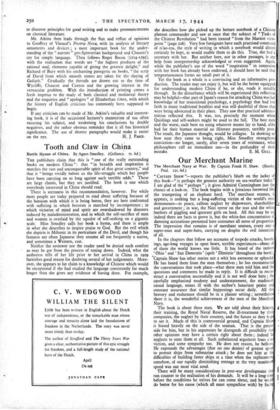Tooth and Claw in China
Battle Hymn of China. By Agnes Smedley. (Gollancz. 7s. 6d.) THE publishers claim that this is "one of the really outstanding books on modern China ": that " in breadth and inspiration it matches the vast and unconquerable spirit of that great country," and that it " brings vividly before us the life-struggle which her people have been carrying on so long against such terrible odds." These are large claims, but they are justified. The book is one which everybody interested in China should read.
There is sternness in this recommendation, however. For while most people are today prepared to read about suffering because of the heroism with which it is being borne, they are here confronted with suffering in which heroism is matched by incompetence ; in which victories of mind and spirit are overshadowed by disasters induced by maladministration, and in which the self-sacrifice of men and women is overlaid by the squalor of self-seeking on a gigantic scale. Miss Smedley calls her book a hymn, and there is ample in what she describes to inspire praise to God. But the evil which she depicts is Miltonic in its portraiture of the Devil, and though his features are often Japanese they assume all too frequently a native, and sometimes a Western, cast.
Neither the reviewer nor the reader need be denied such comfort as may be got from the process of toning down. Indeed, what the authoress tells of her life prior to her arrival in China in 1929 furnishes good reason for doubting several of her judgements. More- over, she appears to lay claim to a knowledge of Chinese which would be exceptional if she had studied the language consistently for much longer than she gives any evidence of having done. For example, she describes how she picked up the lecture notebook of a Chinese platoon commander and saw at once that the subject of "Tasks of the Chinese Revolution " had been treated " from the Marxist view- point " (page 226). Very few foreigners have such practised command of ts'ao-tzu, the style of writing in which a notebook would almost certainly be kept, as would enable them to do this. True, she had a secretary with her. But neither here, nor in other passages, is any help from interpretership acknowledged or even suggested. Again, while the publisher's use of the word " inspiration " in connexion with her book has already been endorsed, it should here be said that tempestuousness forms no small part of it.
Yet the book as a whole is a convincing and an informative pro- duction. The reader may not enjoy it, but will be the better equipped for understanding modern China if he, or she, reads it steadily through. In the disturbance which will be experienced this reflection may be helpful—that part of Japan's reason for attacking China was her knowledge of her transitional psychology, a psychology that had lost faith in many traditional loyalties and was still doubtful of those that were being advocated in their place. They saw that practical adminis-
tration reflected this. It was, too, precisely the moment when Quislings and self-seekers might be used to the full. The best men and the worst, each bent on using whatever means lay to hand, alike had for their human material an illiterate peasantry, terribly poor. The result, the Japanese thought, would be collapse. In showing us how near they came to being right, Miss Smedley strengthens conviction—no longer, surely, after seven years of resistance, what philosophers call an immediate one—in the profundity of their


























 Previous page
Previous page